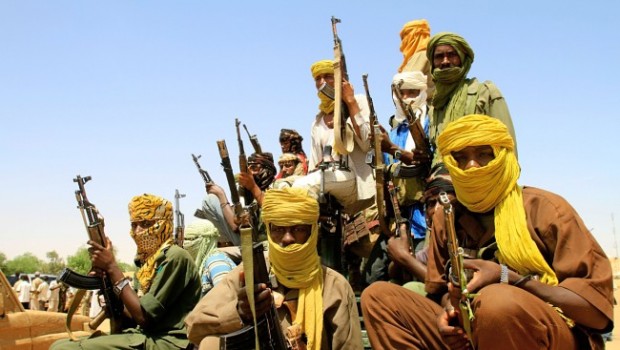
Members of the Justice and Equality Movement, a rebel group in Sudan’s Darfur conflict. (AFP/Getty Images)
Khartoum, Asharq Al-Awsat—The leader of Sudan’s Justice and Equality Movement (JEM) threatened a repeat of its May 2008 attack on Khartoum and Omdurman, saying that the central government is facing “the final chapter of the collapse of the regime.”
In a rare statement to the press, JEM leader Jibril Ibrahim spoke to Asharq Al-Awsat via intermediaries, threatening a repeat of the 2008 attack that marked the group as the key anti-government force in the longstanding Darfur conflict.
“The government has moved its forces from Darfur to central Sudan to be closer to the capital,” Ibrahim said amid reports that the local commander of government forces had been killed by Sudan People’s Liberation Movement-North (SPLM-N), an allied rebel militia.
SPLM-N forces successfully re-seized the strategically important region of Daldako in South Kordofan from Rapid Support-2, a controversial counter-insurgency unit that had only “liberated” it from rebel control last week. Fighting is ongoing between government and rebel forces in the southern province.
Commenting on Khartoum’s use of counter-insurgency units, Ibrahim told Asharq Al-Awsat: “It seems that there is a decision to dissolve the Sudanese Army in favor of special militias that operate outside the law.”
Responding to a question from Asharq Al-Awsat, Ibrahim did not rule out a JEM attack on Khartoum along the lines of “Operation Long Arm,” the May 2008 attack that marked the first time the capital was attacked by rebel forces.
“To be sure, this operation could take place again, but on an even larger scale, particularly after JEM joined the Sudan Revolutionary Front and transferred its operations to places close to the seat of power, rather than fighting in the distant desert, which does not affect those in power.”
The JEM leader threatened also “revenge” against the government for the death of his brother, Khalil Ibrahim, who founded JEM. “Investigations into the assassination of the martyr [Khalil Ibrahim] are ongoing, and we will uncover the details of this crime and who was behind it, and JEM will pursue the criminals responsible for this one by one,” said Jibril Ibrahim.
Khalil Ibrahim was killed in December 2011. The Sudanese Army says he died during clashes against government forces in North Kordofan, but JEM claims that he was killed in a missile strike by an “unidentified aircraft,” alleging that regional or international parties had colluded with officials in Khartoum.
The JEM leader criticized the national dialogue currently being conducted by Khartoum. He said the Sudan Revolutionary Front—of which JEM is a key member, alongside SPLM factions—had already put forward its plan for a comprehensive political solution in Sudan, but that their vision had been rejected by embattled President Omar Al-Bashir.
He pledged that the Sudan Revolutionary Front would continue to work to topple the Bashir government regardless of the results of the national dialogue. “The SPLM is committed to its position within the Revolutionary Front and its rejection of partial solutions in favor of the project to find a comprehensive solution,” he told Asharq Al-Awsat.
